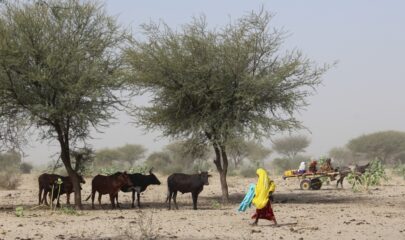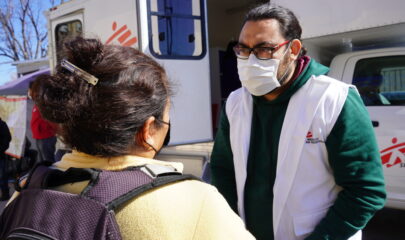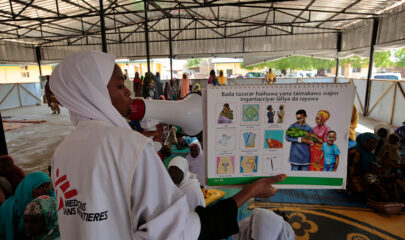A local colleague was describing our humanitarian response in northwest Syria after devastating earthquakes hit there and in south Türkiye in February. They mentioned that some of the people Doctors Without Borders/ Médecins Sans Frontières (MSF) teams are helping have been displaced from their homes up to 20 times in recent years. This striking fact reveals how crises are frequently cascading, one complicating or layering on top of another
In Syria, people have been forced to flee, sometimes repeatedly, as frontlines shift and communities are attacked during more than 12 years of war. The health system is a shell of its pre-war self, access to food and clean water is limited and diseases like cholera are prevalent. People’s support and coping mechanisms have been pushed past their limits many times. And now the earthquakes.
A 68-year-old man, receiving a relief kit from MSF after the quakes hit, said: “The community members who opened their houses to the ones affected by the earthquake don’t have enough resources, they also need assistance.”
“… individual acts of humanity expressed through healthcare”
MSF increasingly responds to complex, multi-layered crises. Climate change may lead to alternating droughts or floods that obliterate livelihoods, force people from their homes and fuel violence. In this edition of Dispatches, we share examples of how this has taken shape in Africa’s Sahel region. We share how childhood malnutrition in northwest Nigeria is a consequence of violent attacks, out-of-reach food prices and climate impacts on livestock and farming.

have fled violence in other countries and are migrating in search of safety. Mexico, 2022.
© Yesika Ocampo/MSF
In Yemen, years of war have left the health system in ruins, with particularly harsh consequences on maternal and child medical care. We look at MSF’s work in some of Yemen’s maternity wards within a complex context in which violence, economic collapse, repeated flooding, disease outbreaks and malnutrition impact women’s and children’s health.
In Haiti, a political vacuum has been filled by neighbourhood-controlling gangs in Port-au-Prince, compounding people’s already limited access to basic goods and healthcare, while also heightening exposure to violence, including sexual violence.
Across the world, the United Nations estimates that more than 100 million people are forced from their homes, driven by multiple causes including violence, neglect, food shortage, disease and climate change. When people are forced to flee, facing unknown and often dangerous journeys, they frequently suffer not only physical but mental trauma too. Here, we also share with you how we are supporting people on the move through Mexico, including with mental health care.
The complexity of the crises MSF responds to can feel daunting, but one of the things I find most inspiring about our work is that it remains deeply personal. In that sense, our job is simple: to create the space for individual acts of humanity expressed through healthcare. I see my role and the role of all our supporters as enabling those simple acts to occur, no matter what caused people’s needs or how complex the situation.


